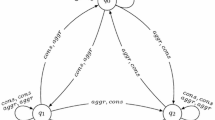Abstract
A well-known result in the logical analysis of cooperative games states that the so-called playable effectivity functions exactly correspond to strategic games. More precisely, this result states that for every playable effectivity function E there exists a strategic game that assigns to coalitions of players exactly the same power as E, and every strategic game generates a playable effectivity function. While the latter direction of the correspondence is correct, we show that the former does not hold for a number of infinite state games. We point out where the original proof of correspondence goes wrong, and we present examples of playable effectivity functions for which no equivalent strategic game exists. Then, we characterize the class of truly playable effectivity functions, that do correspond to strategic games. Moreover, we discuss a construction that transforms any playable effectivity function into a truly playable one while preserving the power of most (but not all) coalitions. We also show that Coalition Logic (CL), a formalism used to reason about effectivity functions, is not expressive enough to distinguish between playable and truly playable effectivity functions, and we extend it to a logic that can make that distinction while still enjoying the good meta-logical properties of CL, such as finite axiomatization and decidability via finite model property.
Similar content being viewed by others
References
Alur R., Henzinger T. A., Kupferman O. (1997) Alternating-time temporal logic. In: de Roever W. P., Langmaack H., Pnueli A. (eds) COMPOS, volume 1536 of Lecture notes in computer science. Springer, Berlin, pp 23–60
Belnap N., Perloff M., Xu M. (2001) Facing the future: Agents and choices in our indeterminist world. Oxford University Press, Oxford
Blackburn P., de Rijke M., Venema Y. (2001) Modal logic. Cambridge Tracts in Theoretical Computer Science, Cambridge, MA
Broersen, J., Herzig, A., & Troquard, N. (2007). A normal simulation of coalition logic and an epistemic extension. In: Samet, D. (Ed.), Proceedings theoretical aspects rationality and knowledge (TARK XI), Brussels (pp 92–101). Athens: ACM Digital Library.
Broersen J., Mastop R., Meyer J.-J. Ch., Turrini P. (2009) Determining the environment: A modal logic for closed interaction. Synthese, special section of Knowledge, Rationality and Action 169(2): 351–369
Chellas B. (1980) Modal logic: An Introduction. Cambridge University Press, Cambridge, MA
Goranko V., Jamroga W. (2004) Comparing semantics of logics for multi-agent systems. Synthese 139(2): 241–280
Goranko V., van Drimmelen G. (2006) Complete axiomatization and decidability of alternating-time temporal logic. Theoretical Computer Science 353(1–3): 93–117
Goranko, V., Jamroga, W., & Turrini, P. (2010). Strategic games and truly playable effectivity functions. In Proceedings of EUMAS2010.
Goranko, V., Jamroga, W., & Turrini, P. (2011). Strategic games and truly playable effectivity functions. In Proceedings of AAMAS2011 (pp 727–734).
Hansen, H. H. (2003). Monotonic modal logics. Master Thesis, Universiteit van Amsterdam.
Hansen, H. H., & Pauly, M. (2002). Axiomatising Nash-consistent coalition logic. In Proceedings of JELIA (pp 394–406).
Moulin H., Peleg B. (1982) Cores of effectivity functions and implementation theory. Journal of Mathematical Economics 10(1): 115–145
Osborne M., Rubinstein A. (1994) A course in Game Theory. The MIT Press, Cambridge, MA
Pauly, M. (2001). Logic for social software. PhD Thesis, University of Amsterdam, ILLC Dissertation Series.
Peleg B. (1998) Effectivity functions, game forms, games and rights. Social Choice and Welfare 15: 67–80
Seylan, İ, & Jamroga, W. (2009). Description logic for coalitions. In Proceedings of AAMAS’09 (pp 425–432).
Author information
Authors and Affiliations
Corresponding author
Rights and permissions
About this article
Cite this article
Goranko, V., Jamroga, W. & Turrini, P. Strategic games and truly playable effectivity functions. Auton Agent Multi-Agent Syst 26, 288–314 (2013). https://doi.org/10.1007/s10458-012-9192-y
Published:
Issue Date:
DOI: https://doi.org/10.1007/s10458-012-9192-y




